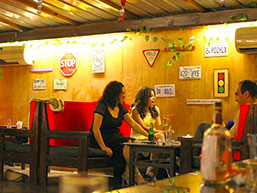NAATI Certified Translation for Joadja
Certified translation examples from Sydney Translation Services.
Driver License
Birth Certificate
Passport Translation
Marriage Certificate
Death Certificate
Divorce Certificate
Degree Certificate
No-Criminal Record
The Gupapuyngu Language

- Unique Phonology: Gupapuyngu, a Yolŋu Matha language of North-East Arnhem Land, features a rich phonological system with distinct sounds that are uncommon in many other languages. Translators must be attuned to the specific sounds and pronunciations to accurately convey meaning, especially when dealing with oral histories or culturally significant texts.
- Oral Tradition: Gupapuyngu is traditionally an oral language, with written forms developed more recently. As such, much of the translation work involves transcribing spoken language, which requires a deep understanding of cultural context and oral storytelling techniques.
- Contextual Sensitivity: Many words and phrases in Gupapuyngu are deeply tied to cultural practices and the local environment. Translators need to ensure that these cultural nuances are preserved in the translation, especially when dealing with ceremonial or traditional knowledge, where mistranslation could lead to significant misinterpretations.
- Translating Legal and Educational Documents: Gupapuyngu is increasingly used in legal and educational contexts, especially in the Northern Territory. Translators working on these types of documents need to ensure that the correct legal and academic terminology is employed, respecting both the traditional language structure and the specific requirements of official communication.
About Joadja
 Joadja was a thriving mining town between 1870–1911. It was home for approximately 1,100 people, many of whom were skilled immigrants from Scotland, and was connected to the nearby town of Mittagong by a narrow gauge railway that terminated adjacent to the main Southern Railway line in Mittagong. The town existed to mine oil shale from which kerosene was extracted by the Australian Kerosene Oil and Mineral Co. The process was superseded by conventional kerosene production from oil and the oil shale mining became uneconomical.
Joadja was a thriving mining town between 1870–1911. It was home for approximately 1,100 people, many of whom were skilled immigrants from Scotland, and was connected to the nearby town of Mittagong by a narrow gauge railway that terminated adjacent to the main Southern Railway line in Mittagong. The town existed to mine oil shale from which kerosene was extracted by the Australian Kerosene Oil and Mineral Co. The process was superseded by conventional kerosene production from oil and the oil shale mining became uneconomical.
By 1911, the town had become deserted as inhabitants relocated in search of work. The property was auctioned off that year to a private buyer. The fruit orchard, which included 6,700 trees continued to operate until 1924, exporting fruit for local and interstate consumption. Situated in a deep valley, the town had limited access by road, instead exporting shale via a steep railway out of the valley. The passage into Joadja has improved greatly since then, with the gravel access road maintained annually. The township is still recognisable, despite the state of its ruins. The sandstone school, the mine, houses, refinery and even the cemetery remain as a testament to the community that lived in the valley more than a century ago.
Other Gupapuyngu Translation Service Locations
Helensburgh Gupapuyngu Translator, Hillgrove Gupapuyngu Translator, Humula Gupapuyngu Translator, Junee Reefs Gupapuyngu Translator, Katoomba Gupapuyngu Translator, Kembla Heights Gupapuyngu Translator.




 Joadja was a thriving mining town between 1870–1911. It was home for approximately 1,100 people, many of whom were skilled immigrants from Scotland, and was connected to the nearby town of Mittagong by a narrow gauge railway that terminated adjacent to the main Southern Railway line in Mittagong. The town existed to mine oil shale from which kerosene was extracted by the Australian Kerosene Oil and Mineral Co. The process was superseded by conventional kerosene production from oil and the oil shale mining became uneconomical.
Joadja was a thriving mining town between 1870–1911. It was home for approximately 1,100 people, many of whom were skilled immigrants from Scotland, and was connected to the nearby town of Mittagong by a narrow gauge railway that terminated adjacent to the main Southern Railway line in Mittagong. The town existed to mine oil shale from which kerosene was extracted by the Australian Kerosene Oil and Mineral Co. The process was superseded by conventional kerosene production from oil and the oil shale mining became uneconomical.